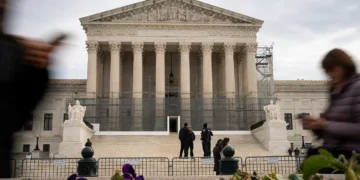April 23, 2025 Story by: Editor
The Supreme Court on Monday said it will weigh whether the U.S. Postal Service can be held liable for failing to deliver mail to a Black landlord who claims her carriers discriminated against her because of her race.
The justices agreed to hear the federal government’s appeal of a lower court ruling allowing Lebene Konan to seek damages over claims the Postal Service intentionally refused to deliver mail to two addresses she leased.
Konan claims two Postal Service employees engaged in a “racially motivated harassment campaign” against her, making it “impossible” for her or her tenants in Euless, Texas, to receive their mail “solely because she is Black.”
The postal workers’ alleged actions — which included changing the designated owner of one of her properties to a white tenant and changing the mailbox lock at the property so only the white tenant could access it — cost Konan thousands of dollars in rental income when tenants moved out after failing to receive important mail like doctor’s bills, medications and credit card statements, she said.
Konan sued the Postal Service under the Federal Tort Claims Act (FTCA), which typically bars tort lawsuits against the government for damages unless a federal employee commits a “wrongful or negligent act” within their official duties. However, the Justice Department says the FTCA doesn’t apply to claims “arising out of the loss, miscarriage, or negligent transmission of letters or postal matter.”
While a district court dismissed Konan’s suit, the U.S. Court of Appeals for the 5th Circuit unanimously allowed it to proceed.
The Justice Department argues that Congress put the postal exception in place to protect mail delivery from “disruptive litigation.”
“[The Postal Service] delivers more than 300 million pieces of mail every day on average,” the government wrote in its petition to the high court. “Under the logic of the Fifth Circuit’s decision, any person whose mail is lost or misdelivered could bring a federal tort suit—and potentially proceed to burdensome discovery—so long as she alleges that a [Postal Service] employee acted intentionally.”
But Konan said Congress’s exception was meant to protect the government from lawsuits stemming from less consequential mail issues than hers, like glassware shattering during shipping or a belated birthday gift.
“This case couldn’t be more different,” Robert Clary, her lawyer, wrote in an opposition brief.
Source: The Hill















